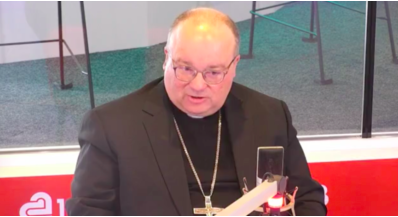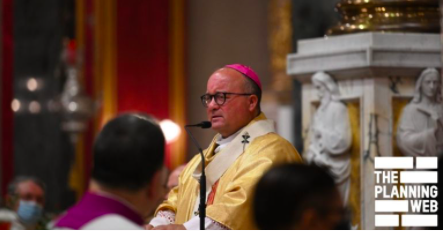Twenty months after he was initially summoned to testify, Archbishop Charles Scicluna’s day in court over the land grab in Gozo may happen in the next few weeks after Magistrate Britgitte Sultana rejected his request last month to testify via video link.
That request to testify virtually was interpreted in certain quarters as reluctance by the archbishop to travel to Gozo due to the anger of hundreds of residents affected by the land grab, which has been featured extensively in Lovin Malta.
The court case involves a family facing eviction from their home build on land held by their ancestors for 130 years.
The family have summoned Scicluna thrice to testify since the beginning of March of 2020.
On the first two occasions, Scicluna filed court applications in which he invoked Article 786 (1) and (2) of civil procedural law – despite this having no relevance on whether an archbishop can be compelled to testify – and by saying that other archdiocese officials could be better placed to answer questions.
On the third order to appear in court last month, the magistrate responded to Scicluna’s request to testify via video link due to other commitments by asking him to specify days on which he would be available to testify in person. The hearing in which the archbishop is now expected to testify in person is set to take place sometime in the next few weeks.
The defendants, the Cauchi family, live in a house at Ta Marga, a hamlet on the outskirts of Qala on the way to Ħondoq Ir-Rummien. Their ancestors leased the land in 1891 from the Beneficcju ta Sant Antonio Delli Navarra, a medieval foundation, or benefice, that was set up to raise money for pious deeds. The residents then converted the lease into outright ownership in the 1990s on the back of various laws.

Foundation rector Patrick Valentino is now seeking to evict the family on the basis that converting their lease to ownership was done outside the bounds of those laws, and in a “deceptive” and “fraudulent” manner.
The archbishop is embroiled in the case because he had decisive power over the granting of land placed under the foundation. Land can be granted via emphyteusis, which can be temporary, in which the property reverts to owner at the expiry of the lease, or perpetual, which allows the lessee to convert the lease into ownership under terms set in the law. But in 2017 Scicluna appointed Valentino as rector and then ceded his power of veto over land transfers.
Then six months after he was appointed rector, Valentino signed an agreement to transfer the land on which the Cauchis’ house sits to a company called Dei Conti Holdings Limited, and then proceeded to file the cause to evict the Cauchis. The Cauchis’ house now sits on land that Valentino has already transferred to Dei Conti.
Dei Conti belongs to six Stagno Navarra siblings who claim to be descended from foundation foundress Cosmana Navarra. The archbishop accepted their claim despite the fact that they produced no independently-verified evidence of their descent, and then went on to sign a contract with them and Valentino in which the archbishop “renounced the right” – vested in the archbishop by the foundress – to give his consent over land transfers.
The land transferred to Dei Conti is about the size of a football pitch; the Cauchi house sits on a small part of it. Dei Conti have since been selling, or doing preliminary agreements, on parts of it for development. This includes a parcel on which an application for a block of ten flats is currently being processed by the Planning Authority, as well as another plot on which the daughter of the lawyer Carmelo Galea got a permit to build a house.
Galea is representing Valentino in court. He is also directly benefitting from foundation land elsewhere through his shareholding and directorship of another company, in partnership with the Stagno Navarras’ and the Montebellos, the family of retired magistrate Dennis Montebello and his two daughters, including serving magistrate Rachel.
Valentino, who is Rachel’s partner, has transferred larger parcels of foundation lands located elsewhere to this other company, Carravan. The latter has been making millions from these lands.
In their testimony in the ongoing court case requesting eviction of the Cauchi family, two archdiocese officials struggled to answer some of the questions.
First up was Michelle Tabone, the archbishop’s legal representative, who was put forward as testifier by the archbishop.
In her testimony, Tabone initially said she did not know who took the decision to sign the contracts that allowed Valentino to make land transfers without archbishop’s consent, saying she was not involved and she signed as “the representative of the archdiocese.”
“Sorry,” the magistrate interjected, “but your signature has certain weight.”
“But as a representative,” Tabone protested.
“So you’re saying,” magistrate Brigitte Sultana said, “that when a contract of this type comes to you fait accompli, all you do at your end is add your signature in a flourish, and you were not interested in the content or anything else, all you do is sign?”
Tabone said that she is “interested” but that the people involved in negotiations or drafting were archdiocese lawyer Domenic Cassar and property manager Raymond Bonnici, and that she signed after being authorised to do so by a church decree or order signed by the archbishop.
The Cauchis’ then summoned the archbishop, and again he invoked Article 768 and this time argued that former property manager Raymond Bonnici could testify, and then the archbishop could testify if there were still unanswered questions.
Asked why Valentino had been appointed rector, Bonnici said that the archbishop had had two nominees for rectors – Valentino and a priest named Jesmond Grech – but he did not know why Scicluna chose Valentino.
The contract of foundation specifies that the rector has to be a male, unmarried descendant of Federico Falzon Navarra and, if no such descendant is found, then a priest until such descendant appears. If none could be found, then any descendant of foundress Cosmana or her cousin Faustina.
Valentino does not fall into any of these categories.
Bonnici admitted that it “was possible” that the appointment of Valentino was something that “departed” from the terms of the contract.
Bonnici also said that the archdiocese did not ask for evidence, or genealogical verification, of the Stagno Navarra’s claim of the descent from the foundress.
Lovin Malta has previously reported that the Stagno Navarras’ were not aware of the existence of the foundation before they were contacted thirty years ago by Gozitan businessperson Joseph Vella who was seeking to acquire land in Qala.
Archbishop Charles Scicluna is now due to testify in the upcoming hearing.
Legal experts consulted by Lovin Malta said that they doubt whether the archbishop could “renounce the right” to give consent to land transfers held under the foundation, as well as appoint Valentino to rectorship (given that he is not a priest, neither descended from foundress or any of her relatives).
Questions sent to the archbishop earlier this year on this point were not answered.
Check out Lovin Malta’s Planning Web, the country’s first transparent and open platform which gives you the opportunity to look at the ins and outs of Malta’s construction industry like you’ve never seen it before.
What do you think of this story? Comment below


Recent Comments